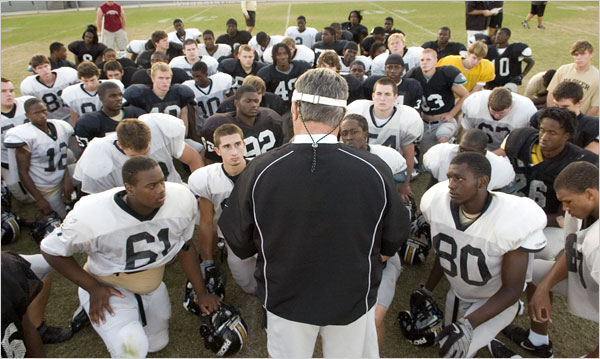
This is a guest post by Jim Harshaw. In addition to learning how to deal successfully with parents as a youth, high school and college coach, Jim Harshaw learned many life lessons on the wrestling mat. He was a 3X ACC Champion for the University of Virginia, trained at the Olympic Training Center and competed overseas for Team USA. He lives in Charlottesville, Va with this wife Allison and four children.
Nine Tactics for Being a More Effective Coach
(Including a few that you can use TODAY!)
When you were a competitor, did you ever imagine that coaching would become one of the most fulfilling parts of your life? Personally, I get a lot of satisfaction from molding young minds and preparing them to overcome challenges, work as a team and develop self-discipline.
I’ve found that the more effective I am as a coach, the more time and energy that I have to impact the lives of young people. Through my research I have found recurring tactics in 9 areas that successful coaches employ to work effectively and efficiently.

Here they are…
- Productivity: Maintain a manual so that you can outsource your most time-consuming, repetitive or annoying tasks. For example, document how to run your fundraiser and then hand it off to a team mom.
- Convenience: Learn to use technology to leverage your time.For example, use simple forms created in Google Docs for athletes to submit their contact and other information.
- Efficiency: Successful coaches batch their work to work most efficiently. For example, instead of planning practice daily, plan a week or month worth of practices (with flexibility built-in of course).
- Effectiveness: Dig your hole in the right spot by evaluating before taking action. For example, conduct a SWOT (strengths, weaknesses, opportunities, threats) before each season.
- Management: Learn to manage difficult people. For example, give the attention seeking team clown a responsibility so that s/he’s engaged instead of distracting.
- Conflict resolution:Realize that conflict is part of leadership and is practically a requirement if you expect to achieve great things.
- Relationships: “Dig Your Well Before You’re Thirsty,” says networking guru Harvey Mackay. For example, build a relationship with your AD, janitor and other people you’ll be calling on for help before you need them.
- Communication skills: Learn key techniques and phrases that will allow you to avoid damaging conflicts. For example, before correcting someone validate their feelings by saying, “I would feel the same if I were you….”
- Tact: It’s easy to get stuck in an endless conversation with an emotional parent. Learn to bow out tactfully. For example, circle the conversation back to where it began to bring finality and an opportunity to exit.
Get many more tips and tactics as well as worksheets and templates garnered from some of the leaders in coaching development in the Dealing Successfully with Sports Parents ebook. This proactive guide will help you spend less time reacting to criticism, responding to emails and looking over your shoulder… and more time coaching.
Click here to get the download.


